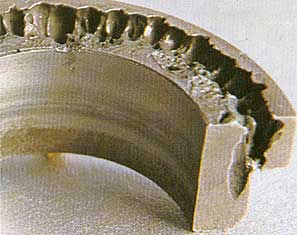| Intergranular corrosion | ||
DIN 50 900, T1 (April 1982) gives this definition: "Selective corrosion with a preference for zones near the grain boundary." The cause of intergranular corrosion is the special corrodibility of grain boundaries or near grainboundary zones owing to deposits on the grain boundaries. During the heat treatment of high-alloy, rustproof and acid-resistant steels, chromium carbides are deposited on the grain boundaries; the adjacent zones are depleted of chromium. Intergranular corrosion tends to affect mechanical seal parts when they are subjected during manufacture to the effect of heat leading to an unintentional but inevitable and irreversible microstructural transformation. A carrier material's susceptibility to intergranular corrosion can be reduced substantially by using the inductive brazing process (soldering). |
 A carrier ring for soidered-on tungsten carbide rings destroyed by intergranular corrosion |
|